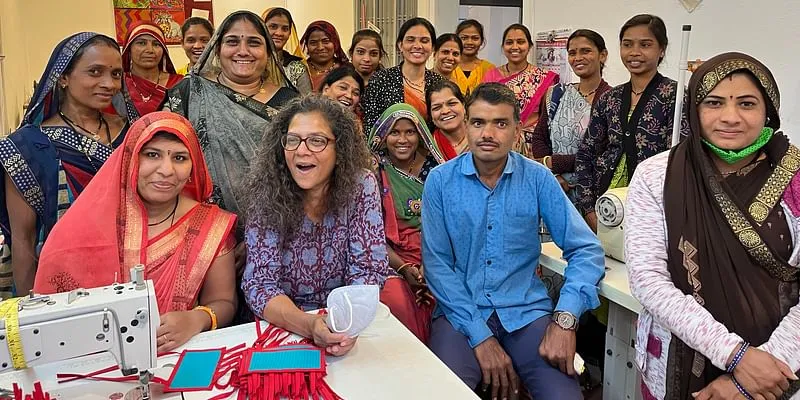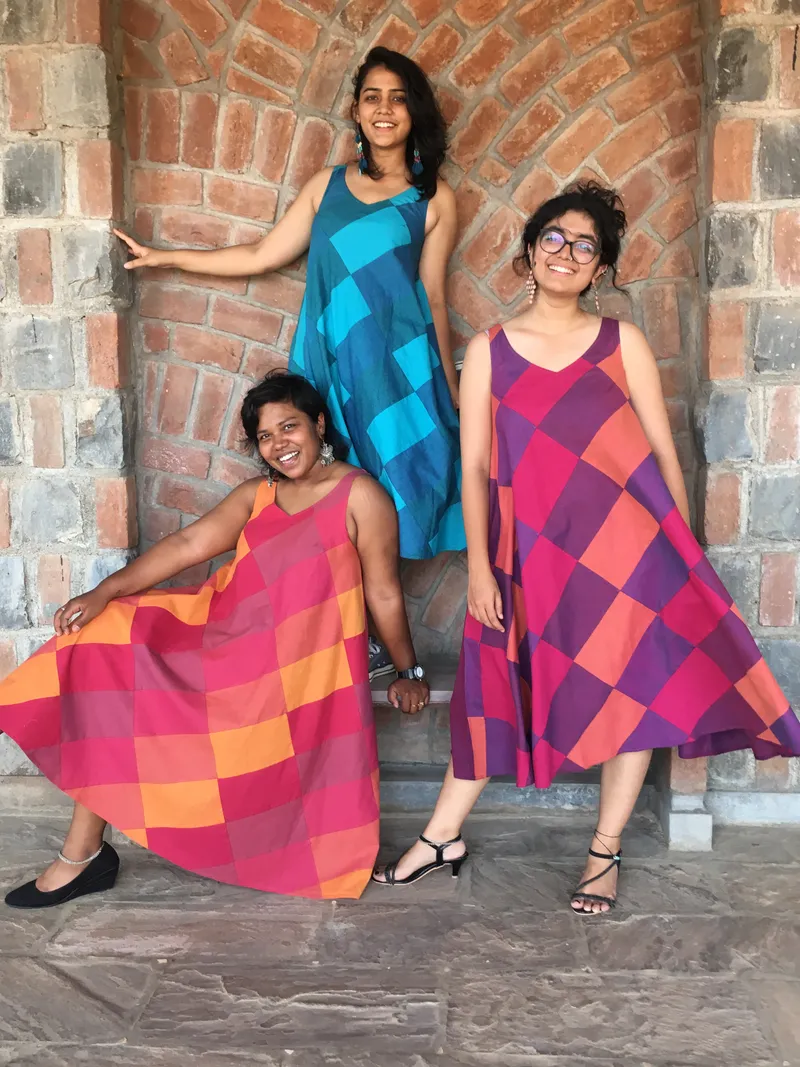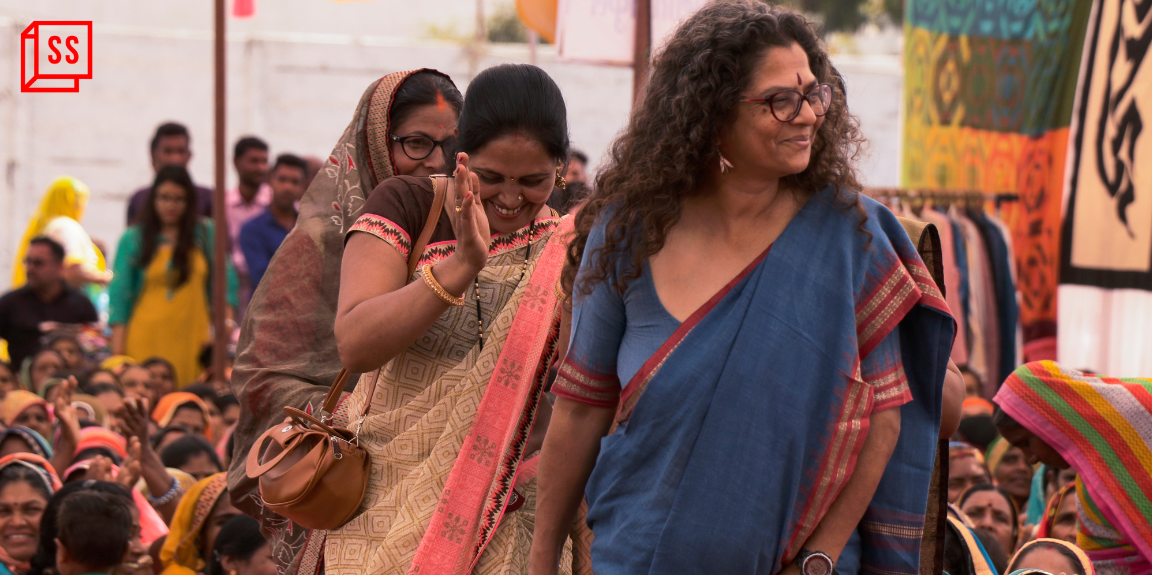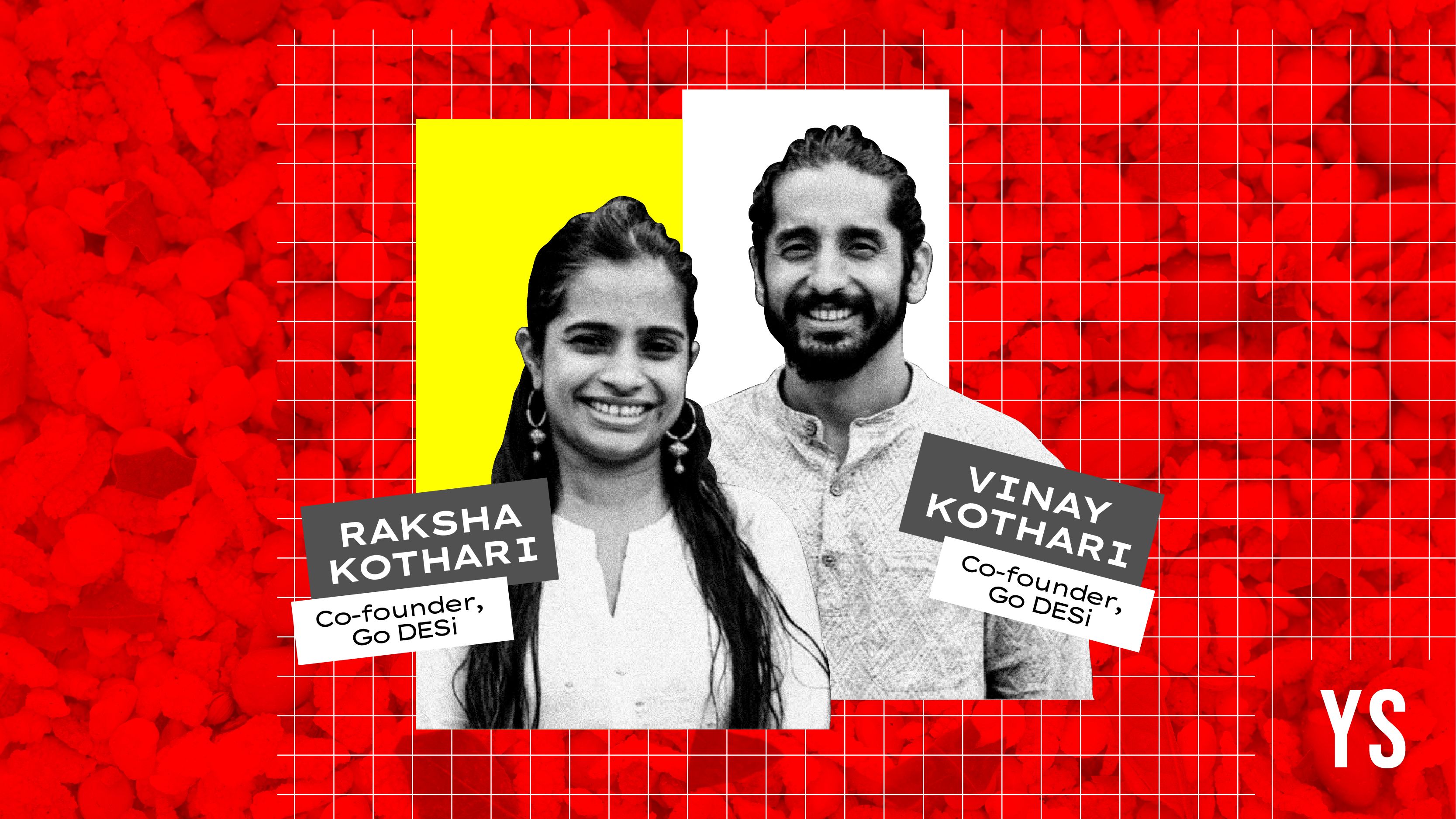A stitch in time: How Kumbaya has changed the lives of tribal women in rural Madhya Pradesh
In 1994, Nivedita Banerji started Kumbaya as a stitching centre in a remote village in Dewas district, Madhya Pradesh. Today, over 100 women from marginalised communities work in Kumbaya Producer Company Ltd, where employment is guaranteed for 300 days a year.
The 1980s in India was marked by many social events—the rise of the feminist movement and everyday activism rooted in fundamental issues. Nivedita Banerji, who was a student at Delhi University and Jawaharlal Nehru University (JNU) at the time, soaked it all in.
She actively took part in the activities as a group member that regularly put on street plays. It was also during this time she understood that social impact can be created outside of her college’s walls.

The Kumbaya Bhavan in Bagli
In 1990, a group of friends, all in their early 20s, including Banerji, guided by social worker Baba Amte started the Samaj Pragati Sahayog (SPS), one of India’s largest grassroots initiatives in rural Madhya Pradesh.
“We set up SPS after the Narmada Bachao Andolan gained momentum. Our goal was to work on water conservation, work on shared water harvesting, building watersheds, and trying to solve the problems of irrigation for agriculture,” she explains.
Within SPS came about Kumbaya—a brand for apparel, patchwork home linen, and accessories that has grown into a producers’ company, empowering women and people with disability with the art of stitching.
And it all began in Neemkheda, a tiny village in Bagli Tehsil of the Dewas district in Madhya Pradesh.
Today, SPS work encompasses water livelihood security and financial inclusion, working with women-led institutions on watershed development, sustainable agriculture, commodity aggregation, livestock, health and nutrition, public education, research, and community media in the region.
While working with tribal communities in Bagli, Banerji noticed that women remained invisible in local governance.
“They were absent, and even if some of them attended the meetings, they remained silent because of the patriarchy and traditional customs,” she says.
While they may seem invisible in politics, this group spent almost 18 hours a day completing tasks from collecting firewood and fodder and working on the land to tending to children adding to an almost endless list of tasks. Even on watershed sites, the women were doing gruelling hard labour, often in the peak of summer, without any complaint and in a positive spirit.
Over time, these women warmed up to the SPS team and started becoming curious about their lives.
“They would come to our houses and on one of these visits, they saw a lot of patchwork I worked with–bedsheets, pillow covers, and cushion covers, and in them, they recognised that I had cut up my kurta, my husband’s kurta, or my father’s kurta to make them. They asked my colleague Subha and me about stitching and whether it was possible to learn it.”
This, Banerji says was the turning point for her and her co-founder Subhlaxmi Pande (Subha).
Facing diverse challenges

Patchwork dresses made from recycled textile waste
While upskilling these women was a priority, the idea was to also make them aware of their rights. At the outset, Banerji and Subha were taken by surprise when 20 women turned up at Kumbaya’s footsteps.
With no money or space, Banerji taught them on borrowed machines. Later, with a National Agricultural Bank for Rural Development (NABARD) loan, she bought 10 sewing machines, and the women started stitching with scraps donated by Banerji’s friends who owned garment factories in Delhi.
Space was still a constraint, but they built a makeshift wooden structure with mud walls that also served as their godown. But the challenges had only begun. The men in the village didn’t like the women stitching and enjoying their own space, so they would come and destroy the work.
While the dissent and conflict were on, one of the founders’ friends helped to show the patchwork to a wholesaler who supplied to the US.
The journey started with patchwork. “She looked at the patchwork bed covers and went crazy. When asked for the price, my friend blurted out, Rs 2,500. It was on the higher side, but the woman didn’t bat an eyelid. She bought all of them and asked for more,” Banerji recalls.
This is when she also thought she could turn into a livelihood opportunity for women in Bagli. Suddenly, the group was in business, with its products exported to the US. They were also earning Rs 100 a day when the minimum agricultural wage for women at that time was between Rs 14 and Rs 25 as mandated by the government.
“I remember after receiving one of the payments, a woman excitedly threw the money into the air; she had earned around Rs 3,000 and said, ‘mera toh bas ho gaya’ (I have earned enough money for the season),” she says.
Despite the economic independence Kumbaya offered these women, discontent was still brewing. One day, the stitching centre (called the Bhavan) was burned down. Banerji blames the axis of power–people with vested interests who controlled the region that included the moneylenders, patwaris, forest guards, and sarpanches.
Though rattled, the team continued with their mission. The Tata Trust pitched in with a small grant of Rs 7 lakh that gave Kumbaya a new lease of life–more machines, a qualified trainer, and a master tailor. More women from other villages too joined in.
Today, over 100 women from marginalised communities are shareholders who own and work in Kumbaya Producer Company Limited, where employment is guaranteed for 300 days a year. Kumbaya continuously works on skill development and has taught stitching to over 2,500 women from 80 villages in the area.
In due course, they started working on designs for simple garments and the collections grew. The demand for stitching spread and Banerji was inundated with requests to open centres in nearby villages.
“The disabled women use the same motorised machines. They even climb up on regular stools while some have different stools that have a step to help them climb up. They can press the pedal for the electric motor with their feet because we raise the mechanism so that their legs reach. There are people who walk on their hands because their legs have been affected,” she says.
Kumbaya started participating in several exhibitions; its products were housed at Keystone, and TRIFED started giving it small orders. Slowly, the visibility grew, and its major source of funding came from the Axis Bank Foundation just before COVID-19 struck.
The pandemic hit Kumbaya badly; over Rs 70 lakh worth of orders were not picked up and suppliers could not be paid on time.
“In 2017-18, we started working with a lot of designers globally. We are slowly limping back to normal, and hope these collaborations will help us bounce back,” she says. It has partnered with brands like Labvisby in Sweden, Alcana in Australia, London Woven in the UK, Rani & Reine in Germany, Zazi Vintage in Amsterdam, and Naushad Ali in India.
Kumbaya can be found at Tribes India stores across India. It also retails at Kriti Eco Boutique in Puducherry; Ambara Ulsoor, Serenity, 12/2 Lifestyle Store, Studio Uga in Bengaluru; MESH in Delhi, and Studio Chim in Goa. It’s also available on Ikikai and rangde.org and its website.
Most of these women who had never stitched a garment before are now able to use the skill to earn money as tailors.
Banerji says nothing is considered waste at Kumbaya, with leftover waste being reused to make another garment besides creating sustainable fabrics. “We have always re-used dead stock discarded by industrial fabric units and bought hand-woven and other artisanal cotton fabric made by skilled craftspeople across the country. I want to make Kumbaya work more on circular fashion and design,” she adds.
(The story has been updated to change the name of the village from Jatashankar to Neemkheda and include two more marketplaces where Kumbaya is available.)
Edited by Akanksha Sarma










